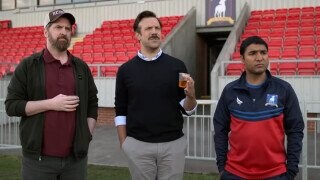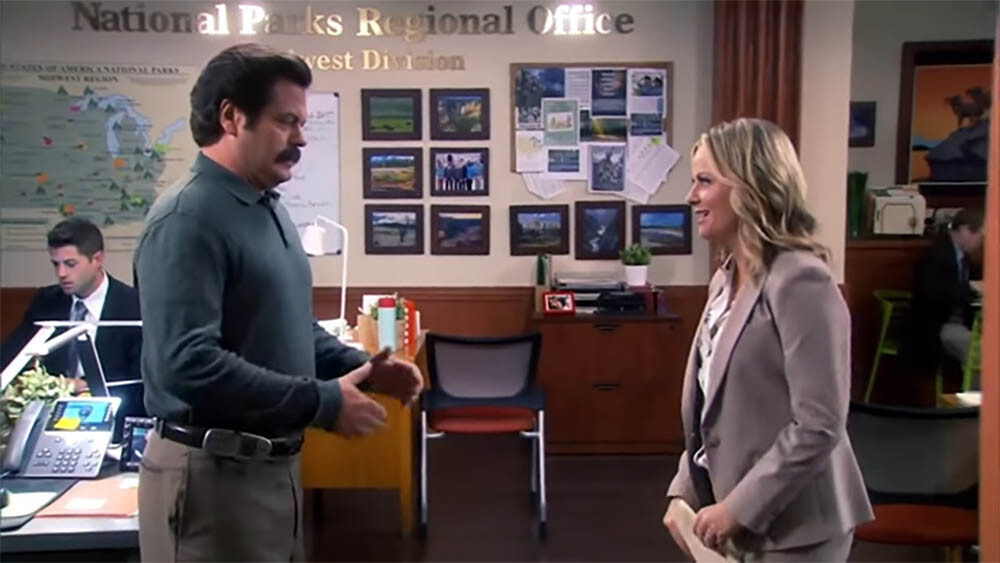Ted Lasso And Why The Comedy Pendulum Swung To Kindness

Welcome to ComedyNerd, Cracked's daily comedy vertical. For more ComedyNerd content, and ongoing coverage of the Iran/Contra Affair, please sign up for the ComedyNerd newsletter below.
Don't Miss
In September, Ted Lasso did what the hapless (but improving!) AFC Richmond football club cannot -- win everything in sight. The show took home seven Emmys, including acting victories for Jason Sudeikis and Hannah Waddingham and a trophy for Best Comedy Series. Unlike when Sudeikis won the Golden Globe, he did not accept the Emmy in a sub-Burning Man-grade tie-dyed hoodie.

YouTube
Last year, it was Schitt’s Creek sweeping the whole dang Emmy Awards, with Catherine O’Hara, Eugene Levy, Annie Murphy, and Dan Levy all triumphing in their respective acting categories and Creek winning television comedy’s Best in Show, albeit at a remote, Hoth-level-cold Canadian location.

YouTube
Coincidence or trend? These comedies, both critical and fan favorites, share an overabundance of optimism in a category that not long ago was dominated by cynicism and snark. These days, television comedies are killing them with kindness.
Of course, mean-spirited comedy will never entirely disappear. But the current run of success enjoyed by Lasso and Schitt’s Creek begs the question:
Have we finally had our fill of cringe?
Comedy is pain
When Seth Rogen was twelve years old, he took a class in stand-up comedy. (He was the only kid in the class and the final exam was performing in a lesbian bar.) In his Yearbook, Rogen remembers the first lecture he received on the art of writing jokes, from a teacher he swears looked just like Garth from Wayne’s World:
Nobody wants to hear about what you like. There’s nothing less funny than hearing about the stuff you have fun doing. Fun isn’t funny. Comedy is pain. It’s struggle. So, when thinking of what to write about, don’t ask yourself, “What’s funny to me?” Ask yourself, “What bothers me? What frustrates me? What do I wish I could change? What can I just not f**king stand?!”
From the annoyed Jerry Seinfeld (“Why are there wanted posters at the post office? Why don’t they hold on to this guy when they’re taking his picture?”) to the irate George Carlin (“I don’t have pet peeves. I have major psychotic f**king hatreds”), comedians have made their bones by doing just what Rogen’s teacher suggested, mining life’s misery to create comedy.

HBO
But a funny thing has been happening to television comedy over the past few years, according to the New York Times’ James Poniewozik.
Earlier this year, Times critics put together a chronological list of the 21 best sitcoms of the 21st century. The list begins with shows like Curb Your Enthusiasm, Arrested Development, and the American Office, “series with comically obnoxious or oblivious protagonists.” But as the century progresses, the list shifts to shows like the warm Better Things and goofy coming-of-age comedy PEN15, “big-hearted shows whose main characters may be imperfect or awkward, but whom you are meant to identify with.”

Lonely Island Classics
Maybe we haven’t noticed, but our best comedies have been making the shift from irony to sincerity. Even cringefest The Office got sweeter and less cynical as the seasons progressed. (It also got objectively worse, but that’s another story.)
What’s behind the shift? Poniewozik theorizes that as antiheroes like the gang from It’s Always Sunny in Philadelphia and cringe comedies like Louie and Girls dominated, they developed their own clichés. Now irony was the standard, ripe for a counter-punch. “It may just have been time,” says Poniewozik, “for the pendulum to swing.”
Who couldn’t use some unrelenting cheerfulness?
Did that swing begin with Parks and Recreation? A precise origin point is impossible to pin down, but Parks and Rec (and its creator Mike Schur, the genial guy behind the equally optimistic The Good Place) surely helped usher in the comedy of nice.
Take Lesley Knope. Her unrelenting cheerfulness and commitment to community are the character’s defining traits, but over the course of the seasons, nearly the whole town of Pawnee comes to share her good heart.
“Here we have pro-government Leslie and staunch libertarian Ron Swanson,” says Vulture’s Chris Kopcow. “Two characters whose philosophies run perpendicular to each other, working together as something like best friends, because their fundamental respect for each other outweighs their differences.”

Open 4 Business Productions, Deedle-Dee Productions
We all know real government never runs this way. But wouldn’t it be nice, argues Parks and Rec, if it did? And maybe, just maybe … it’s possible?
Schitt’s Creek began its run as another entry in the Arrested Development school of sitcom, sour and sarcastic. But as the show progressed (and perhaps not coincidentally, found an enthusiastic audience), it leaned into characters embracing their community, their purpose, and each other.
Famously, the show acted as if the world freely accepted the choices of others. “We show love and tolerance,” says co-creator and star Dan Levy. “If you put something like out of the equation, you’re saying that doesn’t exist and shouldn’t exist.”

Not a Real Company Productions
That made Schitt’s Creek sometimes appear as if it took place “on another planet,” said Washington Post entertainment writer Emily Yahr. “It was a place where the neighbors who drove you crazy actually became your best friends. A place where the most spoiled family ever genuinely came to the realization that love is more important than money.”
As one cast member says in the making-of documentary, Best Wishes, Warmest Regards, Schitt’s Creek “created a better world than we live in.”
Which brings us to today and Ted Lasso, now in its sometimes-controversial second season.
If you were casting an actor to play the embodiment of empathy, odds are you would not have called Jason Sudeikis, an actor who looks like the fraternity brother who hits on your girlfriend as soon as you leave to get her another White Claw. His most famous characters on Saturday Night Live, from one of the A-Holes to his goofy Joe Biden, are irrationally confident, know-nothing blowhards.

NBC
And you certainly couldn’t have predicted the show’s ethos from the SNL-esque promos for NBC soccer, on which Lasso is based. In spirit and tone, they are more aligned with Sudeikis and Will Forte’s ESPN parodies playing good-natured but clueless commentators Pete Twinkle and Greg Stink.

NBC
But Sudeikis and his writers knew what they were after from the start. Lasso showrunner Bill Lawrence says they were looking for an antidote to a world that “specifically on social media and in politics, had gotten to such a cynical, dark place that it was just pervasively gross.”
So they went the other way, encouraging us to look in the mirror in search of our best selves. “There's a great Michael J. Fox quote,” says Sudeikis. “‘Don't assume the worst thing's going to happen, because on the off chance it does, you'll have lived through it twice.’ So…why not do the inverse?” Also, Schrödinger's cat, or something.
“That’s the point of this,” says Lawrence. “We were all very grateful to be working on something that was inherently optimistic. In many ways, it felt almost therapeutic to be working on it. That was without knowing at all, whether or not it would work.”
It worked, partly due to an audience sequestered in their homes due to the COVID-19 pandemic. When the world seemed to be coming apart at the seams, a tall, cool glass of Ted Lasso was just what the overworked doctor ordered. It helped to know there was still good in the world, especially when, as Lawrence says, everybody’s life “is full of some layer of shit.”

Universal Television
You can’t leave out the shit. Criticize Lasso for being overly saccharine if you like, but Ted’s life isn’t rainbows and unicorns. He has panic attacks. His wife left him. His kid is an ocean away. And of course, his soccer team is massively mediocre.
“Just cheery optimism is nearly impossible,” says Lawrence. “It has to be amongst the real pathos of life in order to work.” He argues that “optimistic comedy” is really just about writing with heart and empathy.
The pendulum will swing to horrible once again
So is comedy based on sincerity here to stay? Nice try, genius. Everyone agrees that won’t be the case.
In fact, TV agents and producers are already complaining about the “Ted Lasso effect,” according to Matt Belloni’s What I’m Hearing newsletter. What’s the Ted Lasso effect? “Essentially that studios only want “escapist” projects, like uplifting comedies or light dramadies,” he says.
But today’s buying trends aren’t usually a good indicator of the next wave of hits. As Belloni says, “the good know that going against trend is usually the path to breaking out.”
Creatives like Lasso’s Lawrence believe that trends in comedy will come and go.
“I’m still a guy who watched every episode of Veep twice, and if you asked me to describe that show, it was literally different characters figuring out new ways to be horrible to each other,” he says. “And it was brilliant.”
The bigger shows like Ted Lasso become, the more we can count on comedies like HBO’s acerbic White Lotus to come along and pour a can of bitter acid over everything decent and pure in this world.
We need it all. And as surely as Jason Sudeikis will switch between tuxes and hoodies, the comedy pendulum will continue to swing.
